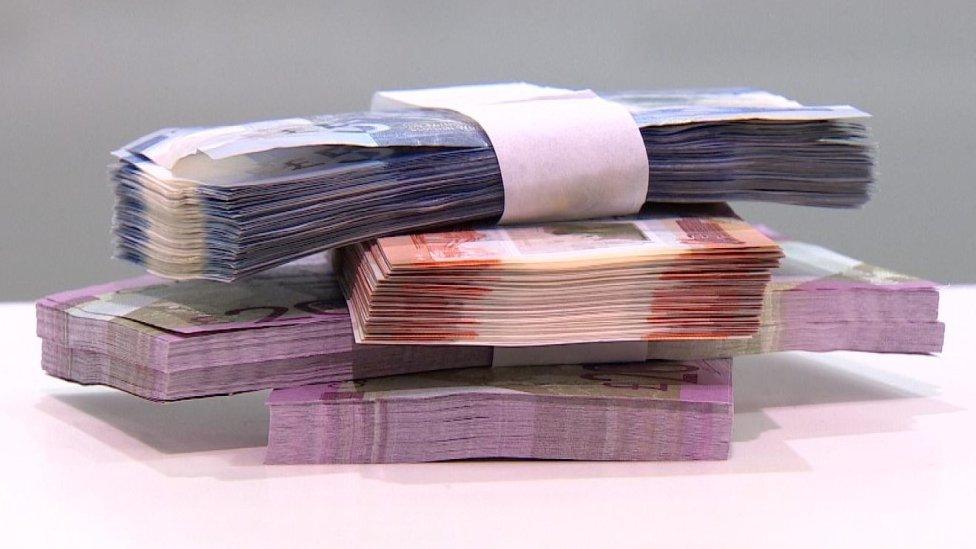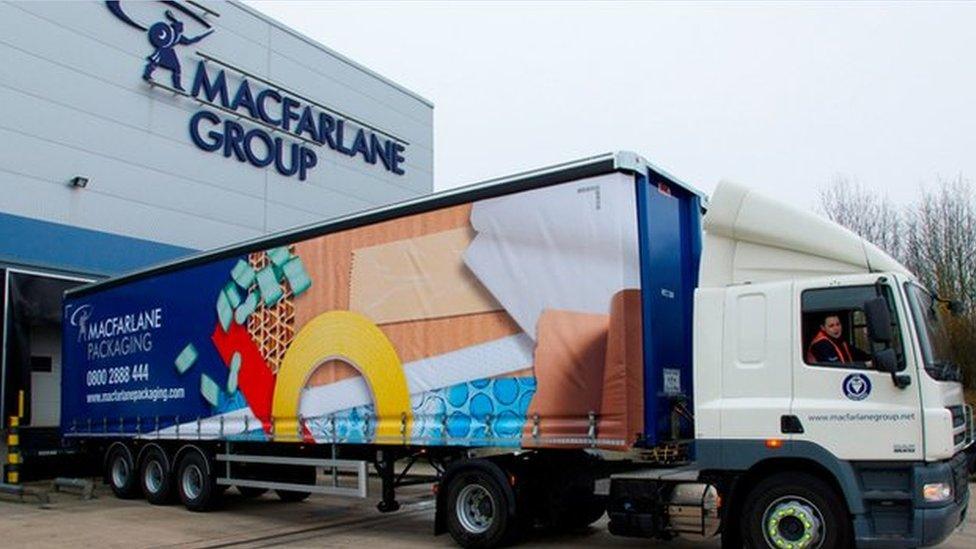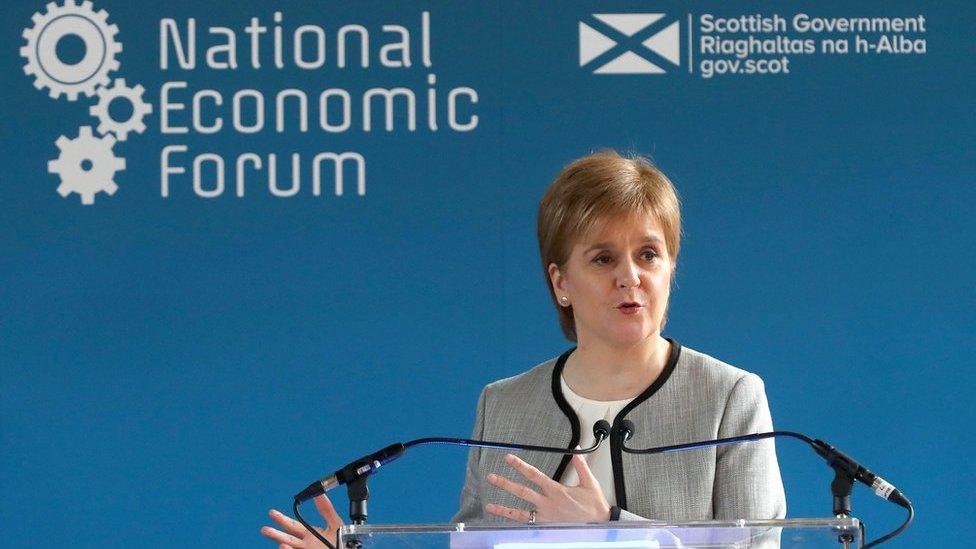Going for Growth
- Published

Next Friday, at last, we're due to get sight of a document likely to shape Scottish politics for quite a while to come. That is at least until someone comes up with anything more interesting or provocative.
The SNP's Growth Commission was announced by Nicola Sturgeon in September 2016, two years after the Scottish referendum, and three months after the Brexit vote.
It has been chaired by economist and former MSP Andrew Wilson, and its membership included Finance Secretary Derek Mackay and Education Minister Shirley-Anne Somerville.
Having them on board carries a risk - it's harder for the SNP to distance itself from any tricky recommendations, though perhaps their presence there was to ensure there aren't any.
The report has been ready for publication for many months. But it seems the time hasn't been right, until now.
Windfalls
It's just a hunch, but that might be because the remit was so broad, requiring the report to head into difficult territory. It goes like this:
"The Commission will assess the projections for Scotland's economy and public finances, consider the implications for our economy and finances of different potential governance scenarios, and make recommendations for policy on:
"Measures to boost economic growth and improve Scotland's public finances - both now in the aftermath of the EU referendum and in the context of independence"
"The potential for and best use of savings from UK programmes in the event of independence, such as Trident"
"The range of transitional cost and benefits associated with independence and arrangements for dealing with future revenue windfalls, including future North Sea Revenues"
In addition, the Commission will "take account of the recommendations of the 2013 Fiscal Commission reports, and the outcome of the EU referendum, and consider the most appropriate monetary policy arrangements to underpin a programme for sustainable growth in an independent Scotland".
Transition
Consider some of the implications, particularly when set against Alex Salmond's Indy prospectus in 2014. For one, either embrace the Government and Expenditure and Revenue Scotland (GERS) figures, or set out the basis to reject them - even though they're from the Scottish government itself.
If you accept GERS, a very large deficit has to be addressed. And we already know from Andrew Wilson that he is not going to massage oil tax revenue to do so. The commission chairman has said the figures were "baked in" to the 2014 prospectus, yet the remit defines them as "a windfall".

The commission will set out how much it thinks can be saved by ditching Trident
Trident makes an appearance, as you might expect, giving the opportunity to take a share of nuclear weapons costs and spend that elsewhere. But a report like this can only spend it once elsewhere.
The cost of the transition to independence? A very rough guess from Alex Salmond in 2014 was that it might cost £200m. As Brexit reality bites, the cost of such transitions are being shown to be very expensive indeed.
And while the benefits could be made to look huge, cost and benefit analyses ought to show when those benefits kick in. They may not yet be delivered when the bills are dropping on the doormat at St Andrew's House.
Currency
A lot of attention will be focused on changes to the economic arguments for independence, when compared with Alex Salmond's White Paper.
It's reported, in the Sunday Post, that the Growth Commission will back a Scottish currency. That should come as no surprise, though the detail is likely to include a mechanism for pegging it to sterling, or maybe the euro.

The case for 'sharing' the pound, because "it belongs to Scotland too," was arguably (and it was argued over, for sure) the weakest point in the Indy prospectus.
The case made four years ago on currency was merely to achieve what was possible. None of the choices looked easy. The remit for the Growth Commission is more specific. It is a monetary system that "underpins sustainable growth".
However, the case against keeping the pound may have become easier to make. Since the Brexit referendum, Scotland sticking with Westminster can no longer be portrayed as the status quo.
Between Brexit and independence, there would be two radical options, both carrying risks and costs, both with potential benefits - plus the third choice, of having both.
The remit of the Growth Commission was also to recommend ways to boost the growth rate ahead of independence, or without it. That has become a more pressing issue since Andrew Wilson's team set to work.
With the downturn in oil and gas came a downturn in growth across the country, hitting a small recession in 2015 and clearly lagging behind the UK's low growth rate.
The recent surge in the oil price, hitting $80 per barrel this week, ought to spark hopes of a recovery for the energy sector, even if oil consumers - including drivers and much of industry - feel the heat of higher fuel and input costs.
Footfall
The past few days have given us some indicators of where the economy has stood recently. They're mixed.
The latest Scottish Retail Consortium figures make grim reading for the nation's shopkeepers. Scotland is not alone in this. Earlier this week, the British figures for footfall registered an "unprecedented" fall.
This is partly down to weak consumer confidence, particularly in non-food sales. It is also as the shift to online sales seems to be gathering pace.

Glasgow packaging firm MacFarlane is doing well
Take Macfarlane Group, as further evidence. The Glasgow packaging firm released a trading update last Tuesday, buoyed up by all the cardboard being used to wrap those parcels for home delivery.
The number that most concerns politicians, unemployment - because it's the economic number that most affects voters - fell slightly in January to March, and remains at historically very low levels. Youth unemployment is at a particularly low level.
Job creation has been fairly good over the past year, but not nearly as strong as across the UK as a whole. From autumn to winter, the number of Scots in employment fell 6,000, while the UK figure leapt on upwards by 197,000. Over the year, the figures look more respectable, but still short of Scotland's population share.
Cheering
The other number that voters feel in their household budgets is the extent to which real buying power is shifting. Real wages - the cash figure minus price inflation - have been negative or very weak through the past decade. A return to real wage growth, albeit by a tiny margin, is welcome, but there's a lot of catching up to do.
That can best and sustainably be achieved with improved productivity, but earlier this month, we got numbers which should continue to cause concern.
It was already weak, but these figures, from the Scottish government, suggest it's getting weaker.
Output per worker increased slightly, but not as fast as hours worked. So the key measure of productivity - output per hour worked - saw it fall in 2017 by 1.1%, compared to a very low, but at least positive, 0.3% the previous year.
The less disappointing news was that it was getting less bad over the year, from a fall in the first two quarters to no improvement in the third quarter and a 1% rise in October to December.
More cheering was news this week that output from the private sector in Scotland, according to the monthly Purchasing Managers Index, registered a pick-up last month.
That's after successive months of wavering around the standstill point, significantly behind the UK index.
Brave
For the Scottish government and the SNP, the political pressure from low growth is... well, it's growing. Conservatives recently put together their reckoning of the amount by which the Scots economy is under-shooting where it might otherwise be. It was a signal of the ground on which they want to take on their rivals.
That's quite a brave thing to do when fellow Conservatives are running the show at Westminster. It can take some blame for the lack of investment confidence while Brexit negotiations stagger on, though less so for the numbers on which Scotland lags the UK.
The Growth Commission report will surely presented as providing a route map to faster growth, and on towards independence.
Or it may provide quite a lot of further ammunition for the government's critics. My hunch is that it will do both.
Well worth a listen (and not because I was the interviewer), Prof Mariana Mazzucato is an adviser to the Scottish and Westminster governments and the European Commission, on ways in which government can shape the economy.
In a half-hour discussion on BBC Radio Scotland, she explained why the state can and should be seen as entrepreneur. You can catch up here, 26 minutes, 23 seconds in.
- Published20 May 2018
